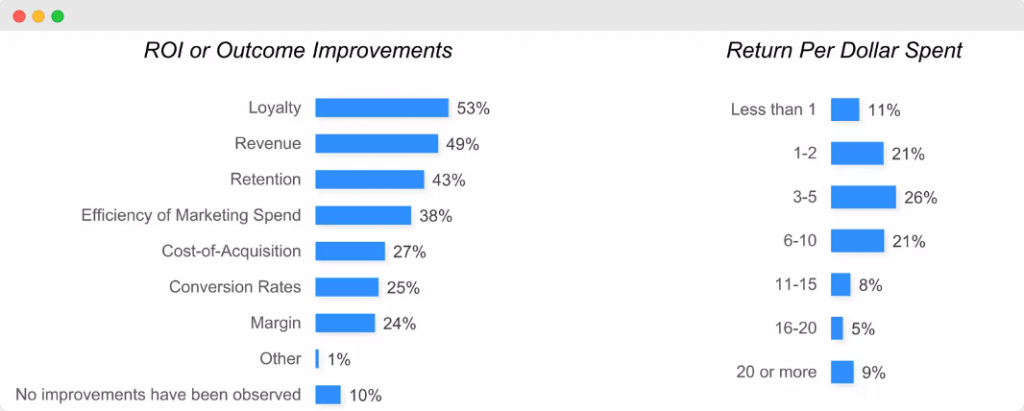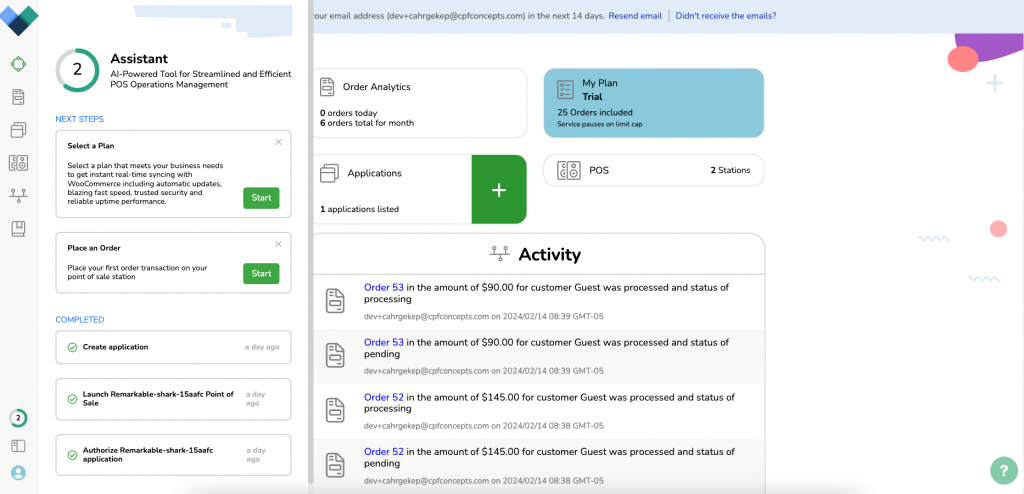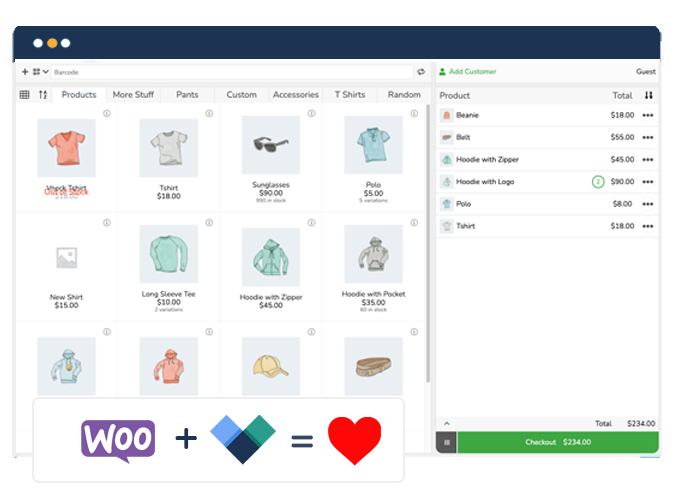Artificial Intelligence (AI) technology is moving at the speed of light, and there are no signs of it stopping anytime soon.
In recent years, we’ve seen that its integration into eCommerce business processes has redefined how companies interact with customers, manage their operations, and strategize for growth.
Naturally, the area that we’re most interested in is the increasingly recognized opportunity for Point of Sale (POS) systems in physical retail environments to integrate with AI. This signifies a shift from conventional transaction-based models to more dynamic, customer-centric frameworks.
This article delves into the potentially transformative role of AI within POS systems. We explore a visionary future where the traditional notion of the POS expands to encompass a broader concept: the Point of Interaction.
The evolving role of AI in eCommerce
Artificial intelligence, a field that once dwelt in the realm of science fiction, has now become a tangible and transformative force in various industries, particularly in eCommerce. At its core, AI is a branch of Computer Science (CS) that enables machines to mimic human intelligence. This includes learning from data, making decisions, and solving complex problems, much like a human would.
The foundations of AI are built on three key concepts:
- Data mining: This process involves extracting valuable patterns and insights from large datasets. In eCommerce, data mining helps businesses uncover trends and associations that can inform decision-making, from predicting customer buying habits to optimizing supply chain processes.
- Natural Language Processing (NLP): NLP enables machines to understand, interpret, and respond to human language in a meaningful way. This technology is crucial for customer service chatbots and voice-activated assistants, allowing natural and useful interactions between businesses and customers.
- Machine Learning (ML): ML is a subset of AI where algorithms learn from and make predictions or decisions based on data. In eCommerce, ML algorithms can personalize shopping experiences, tailor product recommendations, and optimize pricing strategies based on customer behavior and preferences.
A prominent example of AI’s capabilities is ChatGPT, a sophisticated software that has opened the world of AI to the public in a way that no other tool has done before. ChatGPT’s ability to understand and generate human-like text has showcased the immense potential of AI. It is just one of the many AI technologies driving the current wave of adoption across a wide range of industries, including retail, healthcare, finance, and more.
How is AI beneficial in eCommerce?
Optimized inventory management
AI’s ability to analyze vast datasets is revolutionizing inventory management. By leveraging customer purchasing data and predicting buying trends, AI can provide accurate stocking recommendations. This optimization not only ensures that popular items are always in stock but also reduces the wastage associated with overstocking.
Personalized customer experience
According to a study by Adobe, customer experience and loyalty are the areas where companies see the biggest impact after applying greater personalization to their overall strategy.

While classical POS systems focus on transactions, the integration of AI removes traditional friction points, such as fixed cashier stations, and offers personalized shopping assistance, like recommending products in the customer’s size or facilitating home delivery for items unavailable in-store.
Increased fulfillment efficiency
By automating a range of internal processes, AI significantly reduces the need for manual intervention. This automation extends from order processing to logistics, enhancing efficiency across the fulfillment chain.
Data-driven insights
On the business side, AI assists in sophisticated inventory management and data-rich analytics, enhancing operational efficiency, reducing labor costs, and increasing conversion opportunities.
AI’s ability to analyze diverse data points, such as customer engagement metrics, marketing campaign performance, and follow-up notifications, can provide invaluable insights. All this information enables businesses to refine their strategies and optimize various aspects of their operations, from marketing to product development.
All successful eCommerce businesses are using AI in at least one of these areas if not all. Retail giants like Walmart and Amazon are excellent examples of this, utilizing AI to streamline inventory processes and minimize stockouts and surpluses. Shein and ASOS, on the other hand, leverage intelligence technology to offer highly personalized content and recommendations that resonate with individual preferences and history.
AI in omnichannel commerce: From point of sale to point of interaction
AI’s integration in POS systems promises not just enhanced efficiency and profitability for store owners but also a significantly enriched shopping experience for customers across multiple channels.
Sell anywhere, better
The agility to sell anywhere – online, in-store, or on the go – is a hallmark of leading POS systems like Jovvie, but with the integration of AI, this capability is greatly enhanced. AI enables omnichannel stores to elevate the sell anywhere approach by offering a consistently tailored shopping experience, irrespective of the sales channel.
“AI is going to blend in-store and online shopping for businesses. Point-of-sale (POS) systems need to evolve into complete platforms that smoothly connect in-person and online shopping. This change is crucial because the POS system will become the key to improving customer service and increasing online sales in today’s digital world.”
Cory Ferreira – Founder of BizSwoop
This approach is an advanced iteration of conversational commerce, where interaction is key. Customers can engage with stores through popular messaging apps like WhatsApp or Facebook Messenger, making inquiries, receiving personalized product recommendations, or even completing purchases.
For example, you can use a WooCommerce plugin like Flow Notify to connect with your customers at every stage of their buyer’s journey, be it through email, WhatsApp, or SMS. Every time their order status changes, they’ll get a notification on their preferred channel, ensuring clear communication and reliance.
Now, this communication is only one way, but with the power of AI-powered NLP tools, customers can be the ones to reach out to the store, ask for suggestions, or place an inquiry. This isn’t just a chatbot. We’re talking about a system that will be adept at understanding customer needs and preferences, providing relevant information and suggestions about the WooCommerce store that closely aligns with the user’s shopping patterns.
Improve your staffing efficiency
The integration of AI in omnichannel stores is enabling businesses to reallocate resources more efficiently, focusing on areas such as fulfillment and user experience.
Consider Jovvie – our own Point of Sale (POS) plugin for WooCommerce. It contributes to omnichannel retailing by streamlining in-person sales and integrating with online WooCommerce stores.
With Jovvie, you can sell anywhere – online, in-store, or on-the-go. With Jovvie’s powerful built-in AI assistant, there’s scope to do so much more than just process transactions.

If we look ahead to the future, there’s clear potential for Jovvie’s AI assistant to be leveraged to:
- Guide customers through their entire purchase journey, from product scanning and selection to payment.
- Provide personalized recommendations and cross-sell based on customer preferences and purchase history.
- Answer customers on the spot, resolve possible issues, and help with other queries.
- Assist with orders for out-of-stock items or products that will require a home delivery.
- Manage returns and refunds.
Adopting an AI-powered point of interaction model leads to a reduction in staffing costs as the AI assistant can handle multiple customer interactions simultaneously, diminishing the need for a large staff. The purchasing process becomes more streamlined, minimizing wait times and improving customer satisfaction.
Create a customer-first shopping experience
The utilization of AI in automating checkout processes is a significant stride towards creating a customer-first shopping experience in omnichannel stores. By minimizing traditional touchpoints, such as manual checkouts, AI allows for a smoother, more efficient customer journey.
Amazon Dash Cart

Amazon Dash Cart is a pioneering solution that simplifies the shopping process. As customers add or remove items from their Dash Cart, the cart automatically identifies and tallies them, charging the customer’s Amazon account as they exit through a designated Dash Cart lane.
This smart cart also enhances the shopping experience by offering access to real-time discounts, deals, and loyalty pricing. Customers simply scan a QR code in their Amazon app to sync their account with the cart, integrating a seamless shopping and payment process.
Make shopping in your store more dynamic and personal
By intelligently analyzing customer behavior, including past purchases, product views on the store’s website, and current cart contents, AI assistants can offer highly relevant and timely upsell or cross-sell suggestions.
This AI-driven approach enables store owners to engage customers with real-time offers that are not only attractive but also contextually relevant, increasing the Average Order Value (AOV). For instance, the AI assistant could provide shoppers with:
- Quantity discounts: Recognize when a customer adds a specific number of items, like two pairs of socks, to their cart and then suggest a quantity discount for purchasing three or more pairs. This not only incentivizes the customer to buy more but also feels like a tailored recommendation based on their current selections.
- Threshold offers: Identify when a customer’s cart is nearing a certain value, say $50, and propose a discount or a special offer to surpass that threshold. This strategy not only enhances the value perceived by the customer but also strategically boosts the store’s sales.
- Backorder incentives: Notice customer interest in out-of-stock items and offer a special discount or free shipping for placing a backorder. This not only salvages a potential lost sale but also maintains customer interest and satisfaction despite the item’s unavailability.
Supercharge your stocking decisions
While AI’s customer-facing benefits are significant, its value in providing data-driven insights for inventory management is equally transformative for store owners. By analyzing customer purchasing patterns, AI can reveal trends, predict future buying behaviors, and guide smarter stocking decisions, optimizing inventory to meet demand efficiently.
The application of AI in this context can manifest in various practical scenarios, offering store owners actionable insights to enhance their stocking strategy. For instance:
- Optimized stock allocation: In the future, Jovvie’s AI assistant will be able to identify that a particular product is experiencing high sales volumes in one location but not in others. Based on this insight, it could recommend reallocating stock to where the demand is higher, ensuring that each store’s inventory aligns with its specific customer preferences and buying habits.
- Seasonal demand prediction: By analyzing historical sales data, the AI could detect that sales of certain products, like swimwear or outdoor equipment, spike during the summer months. With this knowledge, it might suggest placing larger orders in advance of the season, ensuring that the store is well-stocked to meet the increased demand.
- Freshness-driven purchasing: AI might notice that customers tend to buy products like bakery items or perishable goods only when they’re very fresh. Consequently, it could recommend adjusting the ordering pattern to smaller, more frequent deliveries. This approach would maximize sales by consistently offering fresh products, enhancing customer satisfaction, and reducing waste from unsold, perishable stock.
Maximizing AI effectiveness in omnichannel commerce
While AI is undoubtedly transforming the landscape of eCommerce, realizing its full potential requires a careful blend of technology and human insight. Despite its advanced capabilities, AI still has limitations that can only be handled by human intervention.
- The dependency on the quality and quantity of data. AI systems learn and make decisions based on the data fed into them. If this data is biased or insufficient, it can lead to skewed or inaccurate outcomes. This is where human oversight becomes crucial, ensuring that AI algorithms are trained on diverse, comprehensive, and unbiased data sets.
- Lack of nuanced understanding of human emotions and cultural contexts. AI, particularly in its current state, struggles with interpreting the subtleties of human emotions, sentiments, and cultural nuances that are often critical in customer interactions. Human team members are essential in bridging this gap, providing the empathy and understanding that AI cannot fully replicate.
- Inflexibility as AI systems adhere strictly to programmed algorithms. Humans, on the other hand, can adapt quickly to unforeseen situations and make decisions based on a combination of data, experience, and intuition.
Therefore, the key to maximizing AI’s effectiveness in omnichannel eCommerce is finding the right balance. Leveraging AI for its efficiency, scalability, and analytical powers while employing human expertise for creativity, emotional intelligence, and strategic decision-making creates a synergistic approach.
This combination ensures that eCommerce businesses can harness the best of both worlds, leading to more informed decisions, improved customer experiences, and enhanced operational efficiency.
Embracing the power of AI in omnichannel eCommerce
The transformative potential of AI in eCommerce, particularly for omnichannel stores, is undeniable. As the industry evolves from a traditional point of sale to a more dynamic point of interaction, AI stands at the forefront of this revolution.
However, it’s crucial to acknowledge the need for a harmonious balance between AI-powered automation and human intuition. While AI brings unparalleled efficiency and data-driven insights, the human element remains irreplaceable for its empathy, creativity, and contextual understanding. It’s this synergy between AI and human expertise that truly unlocks the potential of omnichannel eCommerce.
BizSwoop exemplifies this balance, combining the capabilities of AI to automate and streamline operations with the critical role of human input:
- Jovvie is a user-friendly POS system that connects your WooCommerce store with your physical store and is filled with useful AI features such as dynamic live inventory, self-checkout, and customer management.
- BizPrint has an AI product mapping feature that uses different variables, for example, the customer’s location or the items in their order, to automatically print the relevant documents at the relevant fulfillment centre. This is extremely useful for businesses with multiple warehouses and store locations, allowing them to control the entire printing process to all locations from a single dashboard.
- Lastly, Flow Notify can be used to send automatic notifications to customers in the channel most convenient to them.
As we look to the future, the prospects for AI in omnichannel eCommerce are incredibly promising. With platforms like Jovvie leading the way, the transition from point of sale to point of interaction is set to redefine the retail landscape.


